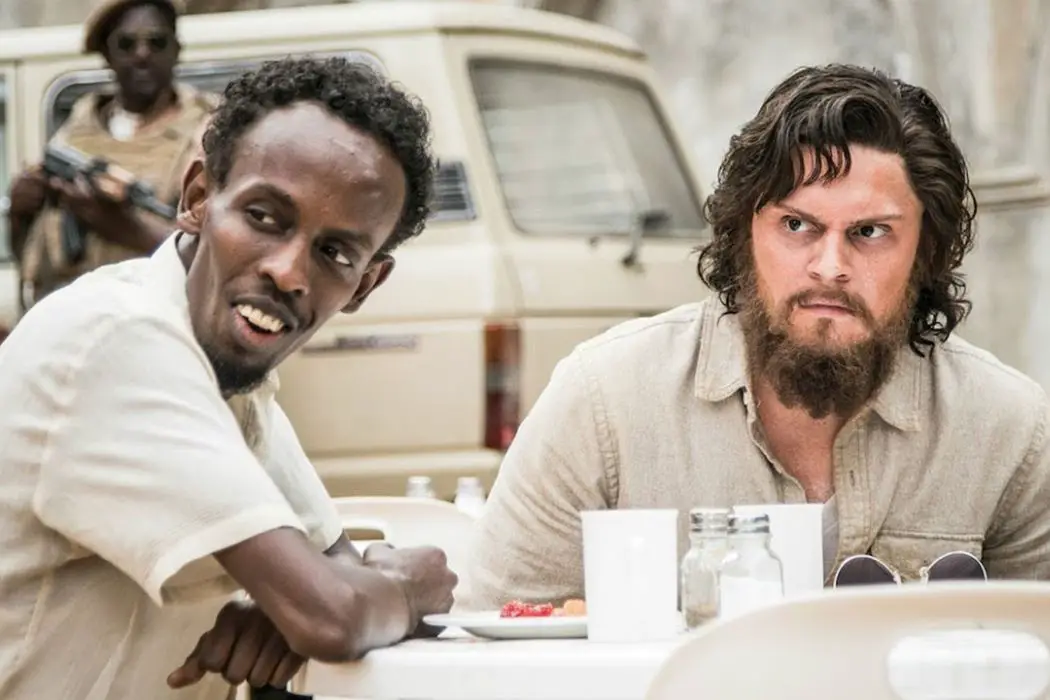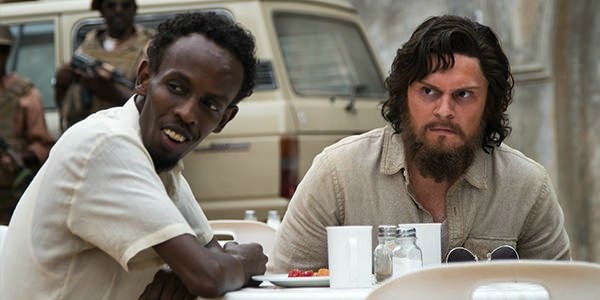THE PIRATES OF SOMALIA: Deftly Jettisons Stereotypes For An Essential Viewing

Alex Arabian is a freelance film journalist and filmmaker. His…
In most mainstream media and film, there hasn’t been much gray area in the portrayal of Somali pirates. They’re often uniformly villainized without any context. The Pirates Of Somalia, based on investigative reporter Jay Bahadur’s (played outstandingly by Evan Peters) semi-eponymous book, portrays both sides of the conflict in war-torn Somalia: the new democracy and the old views, which hold the pirates in high regards as the protectors of Somalia. It’s a violent struggle for power that Bahadur places himself in the middle of. Director Bryan Buckley (Asad) adapts Bahadur’s book loyally, doing his story justice, while exposing the political conflict and evolution of the pirates’ plights with a careful eye.
Mario Savio’s speech, Operation Of The Machine sets the tone for Bahadur’s hellbent quest to get published and avoid being a cog in the system, so to speak. He wants to take the road less travelled, and, as such, he ventures to a place where no news network, at the time, had dared to go. His book was the first of its kind. With prodigious acting from Peters and Al Pacino as a fictitious retired reporter, solid narration, a noble avoidance of stereotypes in its titular reference, eccentric direction, and a subtle comment on the highs and lows of the millennial generation, The Pirates Of Somalia succeeds in more ways than the title would suggest.
Who Is Jay Bahadur? A Product Of The Millennial Generation…
For better or for worse, naïveté abound. Bahadur was, at the time, an investigative writer who was still unpublished and living in his parents’ basement. To his credit, he had only graduated from the University of Toronto mere months prior to the start of The Pirates Of Somalia. It’s an all-too-familiar story for the millennial generation, particularly for millennials who graduated in 2007 and 2008, entering what would be the worst recession since the Great Depression. Plans to pave one’s own path to self-sufficiency vanish, and living with parents after college becomes almost the new norm.
Bahadur is highly analytical, interpreting the world in a unique way; he has a fervent curiosity for way the human mind reacts to specific things. He takes pleasure in making a change, even the smallest changes that nobody would notice such as fundamentally changing the type of paper towels people use in their homes. By all means, he is a brilliant, one-of-a-kind mind. He is a man who takes constant rejection from seemingly every major publication. Viewers may notice that he has an All The President’s Men poster on his wall in his isolated basement. This signifies Bahadur’s longing to be a great “detective,” or, in this case, an investigative journalist; he holds himself to extremely high standards with plans to go to Harvard.

By happenstance, Bahador meets the retired Seymour Tolbin (Pacino), one the foremost reporters during the Vietnam War and one of his heroes (the name of this person is changed for confidentiality purposes). Tolbin coaches the rookie Bahadur, and finds promise in his prose. The rest, as they say, is history.
“Journalism Isn’t Taught, It’s Innate”
Explains Pacino’s Tolbin. Pacino and Peters make for a solid mentor-mentee duo. Their chemistry is instant, and, although Peters may seem a bit overenthusiastic at times (even before he enters Somalia), it doesn’t take away from his magnetic performance. One gets the sense that he is playing the role exactly how Bahadur is, and the viewer can’t really fault him for that. Peters has already established himself as a television ace through his chameleon-like performances in the anthology series, American Horror Story, but The Pirates Of Somalia will mark his first major dramatic turn on the big screen.
Though Pacino doesn’t have much screen time, the larger-than-life acting legend doesn’t need extensive screen time to make a significant presence. Per the advice of Tolbin, Bahador forgoes Harvard to go where no journalist would dare to go at the time: Somalia. Bahador goes for broke, and, as he ventures further into Garowe, he realizes finances aren’t all that is at stake; kidnapping and killing journalists had become an unfortunately (a word Bahadur loathes, as it is unsympathetically used in the first sentence in most rejection letters) popular trend in Somalia.

Bahadur is a fish out of water in this country at first, particularly in Garowe. However, Peters’ transformation from afraid, naive amateur journalist to wannabe local is stupefyingly convincing. Bahadur made it farther than any white man has before, immersing himself in the culture head first. However, over the months, he never develops the slang and customs well enough to integrate himself fully. He does his best, but, during the infamous Captain Phillips hostage situation, he becomes reckless and undoes much of his progress towards the goal of trying to get live hostage footage on an unwelcome boat in Somali territory to gain notoriety.
Applaudable Direction, Cinematography, & Animation
Although some of them come out of nowhere, Buckley uses dizzyingly effective dream sequences, even when they walk the line of feverish nightmares. After all, Bahadur is a dreamer; one has to be, to some extent, in order to be an investigative journalist. The direction is sure-handed, and, when it needs to be, guerilla-styled, mirroring Bahadur’s wild journalistic adventure. As Bahadur thinks about his ex-girlfriend throughout the first half of The Pirates Of Somalia, whom he hasn’t yet gotten over, cinematographer Scott Henriksen cleverly infuses her reflection onto various translucent surfaces.
Bahadur lives partially in the past and worries about the future, as most younger generations increasingly do in the age of social media and heightened technology. As he explains, Edgar Allen Poe, Oscar Wilde, Herman Melville, H.P. Lovecraft all died broke and entirely penniless. He almost romanticizes this concept of the starving artist. He essentially lived it for a year in Somalia, spending the little money he had primarily on drugs.
Throughout the film, there is a unique use of animation during drug-induced sequences and moments of recreating terror-laden incidents. It is also used to explain how the pirates successfully “make” their money. Bahadur becomes increasingly manic as he ingests Khat, the drug that has ravaged a sizable portion of the population of Somalia. It is highly addictive, as it contains the alkaloid cathinone, an amphetamine-like stimulant which causes euphoria and people to talk incessantly fast among other unwanted side-effects. It is a custom to bring Khat to every meeting with a leader of the pirates. As Bahadur continues to take the drug, Buckley’s direction becomes more fast-paced, seemingly emulating the feeling of one being high on Khat.
Overcoming The Past; Overlooking Stereotypes
Bahadur has a human yearning for success. Not just financial success, but personal fulfillment and the aforementioned desire for change. In this case, that desire for change is to expose the world to who the Somali pirates really are; Bahadur wants to portray them as the multidimensional humans that they are. Somalia used to be a nation of poets, using poems to settle feuds instead of weapons. Then, western colonization by the Italians and English introduced them to harsh brutality in the 20th century by way of guns and ammunition. One can notice traces of both the old culture and new throughout The Pirates Of Somalia. It was in 1991, when the United States informally severed diplomatic relations with Somalia, when things took an even worse turn for the nation.

Barkhad Abdi plays Bahadur’s translator, Abdi. It is refreshing to see him not typecast as a Somali pirate, or, as the old political party in Somalia calls them, “the saviors of the sea.” Abdi’s character states that they are more like the coastguards of the Somalia since the west cut ties with them. However, this ideology conflicts with the new democratic government who view them as dangerous gangsters and call them pirates, as Bahadur discovers through his meeting with the president of Somalia.
Unlike the nervous, unsure-of-himself young man yearning for a better life in Captain Phillips, Abdi inhabits this character with confidence, calmness, and wiseness. He has a blast playing Abdi, infusing him with humor in between moments of genuine sincerity and, at times, terror from Bahadur’s point-of-view. It’s slightly difficult for audiences not to notice an unintentional breaking of the fourth wall with the Captain Phillips reference, as Abdi played the pirate who was captured in the aftermath of the hostage situation. However, Abdi is such a strong actor that the cinematic coincidence vanishes in the viewer’s mind in an instant.
Once the interviews with the pirates begin, the film takes off, and, with the help of Andrew Feltenstein and John Nau’s score, fear sets in. Bahadur interviews two pirates: Boyah (Mohamed Barre) and Garaad (Mohamed Osmail Ibrahim), the leader, or “godfather of the pirates,” and husband of Bahadur’s love interest, Katlyn (Coral Peña). During the first Boyah interview, Bahadur is rightfully afraid for his life, as he is not used to the customs. As Boyah’s interviews progress, it gets decidedly more easygoing as he becomes used more used to said customs.
It is through these interviews that we learn the evolution of the motives of the pirates. They saw themselves righteous vigilantes, protecting their waters from illegal fishing. However, what they became were deadly criminals with a skewed moral compass. Eventually, the conflict in Somalia escalates, and it becomes too dangerous for Bahadur to remain there as a visitor.
The Pirates of Somalia: A Wild, Insightful, & Eye-Opening Ride
“They say in Somalia every man is his own Sultan. Then in my mind, Abdi was a glorious king among Sultans.” Bahadur explains of his jack-of-all-trades translator, Abdi; he was forever changed by his experience. Through his narration, Peters’ Bahadur explains to the viewer to think of Somalia as a younger version of “ourselves,” a democratic nation, and that we should not treat the nation with such hostility. With the help of Pacino’s Tolbin, Bahadur is put in touch with a publisher, and the book that he worked so feverishly on during his time in Somalia was finally published, hence the film we have in theaters today.
The Pirates Of Somalia isn’t perfect, as some of the dream and animation sequences can be a bit jarring, but they are wonderfully crafted; it’s only a matter of slightly choppy transitions. However, it aptly reflects the personality of the protagonist, Bahadur. He’s an absolutely ferocious prodigy; he’s an, at times, unhinged genius. One may wish the film spent more time developing the love story between Katlyn and Bahadur, but, as unpredictable as the conflict in Somalia is, there was never enough time for that relationship to develop in real life, and it ended as suddenly as Bahadur had to evacuate.
The Pirates Of Somalia stays true to its source material with a thoroughly insightful and honest exposé, an infectious teacher-pupil relationship between Pacino and Peters, it marks Peters’ arrival as a cinematic virtuoso and yet another outstanding directorial effort from Oscar nominee Bryan Buckley.
Have you read Jay Bahadur’s exposé, The Pirates Of Somalia: Inside Their Hidden World? Are you excited to see it come to life with Bryan Buckley’s new directorial effort?
The Pirates Of Somalia opens to limited theatrical release and digital streaming services in the U.S. on December 8.
Does content like this matter to you?
Become a Member and support film journalism. Unlock access to all of Film Inquiry`s great articles. Join a community of like-minded readers who are passionate about cinema - get access to our private members Network, give back to independent filmmakers, and more.
Alex Arabian is a freelance film journalist and filmmaker. His work has been featured in the San Francisco Examiner, The Playlist, Awards Circuit, and Pop Matters. His favorite film is Edward Scissorhands. Check out more of his work on makingacinephile.com!












